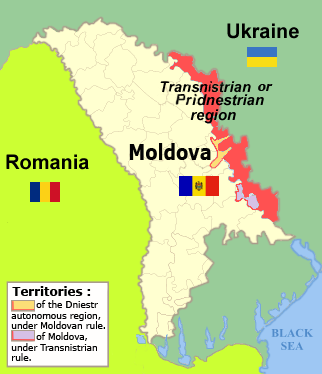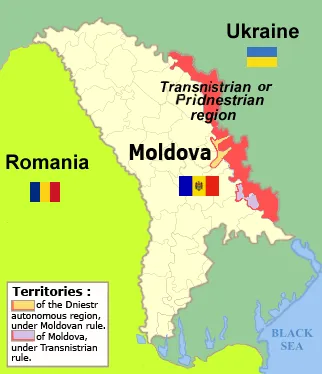Transnistrian separatism as an expression of Russian expansionism
During the last months, the separatist region in the east of the Republic of Moldova, Transnistria, is in the center of attention of the media in Russia and around the world. The growing interest in this area under the military occupation of the Russian State is determined by the golden dream of the current Kremlin leadership to succeed in taking military control over the Odessa region, which borders Transnistria. In any case, the situation on the Ukrainian front seems to encourage this probability.

And the hysterical propaganda undertaken by the occupation administration from Tiraspol, which claims to be terrorized and subjected to an economic blockade by the "neighbouring state" the Republic of Moldova, is nothing more than a manoeuvre intended to justify the subsequent annexation of this territory by Russia. We note in passing that separatism is a classic weapon of empires to maintain their influence in former colonies. And our case is not an exception. The Kremlin has never come to terms with the enormous geopolitical loss represented by the collapse of the USSR and has not abandoned its obsession with recovering its "lost territories". Therefore, all the former ex-Soviet republics are the target of the major interests of Russian expansionism.
It should also be noted that Russia's illegal military presence in Transnistria is the only factor that determines the existence of Transnistrian secessionism. Of course, the entire history of the world is nothing but the imposition of ”the right of force”, and not ”the force of right”. And the winners are the ones who write the history. But that does not relieve me of the obligation to tell the truth from the perspective of a frontier people, at the crossroads of antagonistic geopolitical interests.
I would make a historical analogy related to the Ribbentrop-Molotov Pact of 1939 and the territorial expansion of the USSR in 1940. The territory of the current Republic of Moldova (with the exception of Transnistria) was part of the Romanian State. And the magic formula that pretexted the annexation of Bessarabia to the USSR can be found in the ultimate note of the Soviet government, signed by Veaceslav Molotov: "Today, when the military backwardness of Soviet Russia has remained in the past..."
This historical analogy is self-evident, since Putin himself and his entire team officially claim to impose their own order in Transnistria by force of arms. And just today, February 28, in Tiraspol, the capital of the secessionist region, a meeting was held called "the congress of deputies of all levels" (deputies are considered all local councillors, according to the Soviet model). The separatists shout that they would be subject to an "economic blockade" from Moldova and ask for help from those under whose protectorate they are, the Moscow authorities.
What does this "blockage" consist of? The thing is that the enterprises in the occupation zone want to continue exporting goods all over the world based on official documents of Moldova, but without any fiscal obligation towards our state. Moreover, in this "tax paradise" or "black hole" for more than three decades, the consumption of gas supplied by "Gazprom" was transferred to the account of the debts of the Republic of Moldova. And when the Moldovan authorities try to bring order through perfectly legal, legislative instruments, not military or police, in the economic activity in this rebellious region, the mafia leaders there resort to victimization and to "sensitizing international organizations".
One of the basic lies of the Kremlin's propaganda related to "defending the interests of ethnic Russians in Transnistria" is easy to debunk. First of all, the Russians are a minority in relation to the ethnic Romanian (Moldovan) and Ukrainian population in this area. Secondly, the majority of ethnic Russians live in urban areas of the country, such as the capital Chisinau, but they do not seek "self-determination" because they lack the basic factor, the Russian military presence.
Another stratagem of Russia expansionist policy during the post-Soviet period was the massive granting of Russian state citizenship to residents of the former Soviet republics, including those from the Republic of Moldova. This strategy was aimed at the pretext of defending their interests in relation to the authorities of the states where they live. Indeed, the Kremlin has methodically cultivated the disloyalty of ethnic Russians to the newly independent states, which it is eager to annex when favourable conditions arise.
Thus, these Russian-speaking populations were transformed into destabilizing, subversive elements in the ex-Soviet space. The reluctance to adapt to the condition of a national minority in another country, the obsession with the lost aggrandizement, which offered the dominant nation status in the USSR, represented a major risk factor for several former Soviet republics. And in this sense, the 200,000 Russian citizens of Transnistria are used as a pretext to justify the annexation plans of this region.
Transnistria is still not officially annexed by the Russia only because Ukraine is between this state and our country. So that in this case too, geography conditions the relations between states and peoples. Otherwise, the Republic of Moldova would have suffered the fate of Georgia, which lost two important parts of the country back in 2008. Let's leave aside the fact that Saakashvili was the American puppet. He tried to restore the territorial unity of his own country, and Russia took advantage of the moment and resorted to its angelic peacemakers.
At the moment, everyone is waiting for Putin's speech tomorrow, February 29. Will this refer to Transnistria or not? And if so, will there be a repeat of the scenario with the 4 regions in eastern Ukraine? We cannot rule out such an outcome at all. It can happen both tomorrow and in a very short time, depending on the speed with which the Russian army will advance towards Odessa.
In this situation, which fits into the larger picture of the confrontation between Russia and the collective West, the alternative media in the West, present themselves as unconditional followers of official Kremlin policy. And maybe it cannot be otherwise when it comes to someone from Western Europe or the USA, who does not have the unfortunate historical experience of a people dominated by the Soviet empire. They also find Stalin more likable than Trotsky. But the peoples terrorized by the USSR have a different perspective on the happy coexistence with their neighbours from the East. And they don't want to end up with today's masters of the Kremlin again.
In the confrontation between NATO and Russia no country in our region can evade it. It is true that according to the Constitution of the Republic of Moldova, we are a neutral state. But no one takes that into account. It could only have mattered if a similar agreement had been reached with Austria, when the USSR and the Anglo-Americans agreed on its neutrality. But just as post-war agreements are no longer respected, and the geopolitical imbalance risks turning into a new world massacre, neither does our neutrality matter.

To the question under what kind of occupation you would like to be, Russian or American, any Moldovan patriot should answer: ”Both are worst”. You can reproach me that in geopolitics it does not know spaces that would be in a vacuum, but you can't force me to lie that a state of occupation would be preferable to another state of occupation. And to the mention that the third possibility is excluded, I can only add that this is the drama of the border nations. And anyway we would justify the expansion of NATO or Russia, this drama does not disappear, it is only covered by disinformation and mutual accusations.
